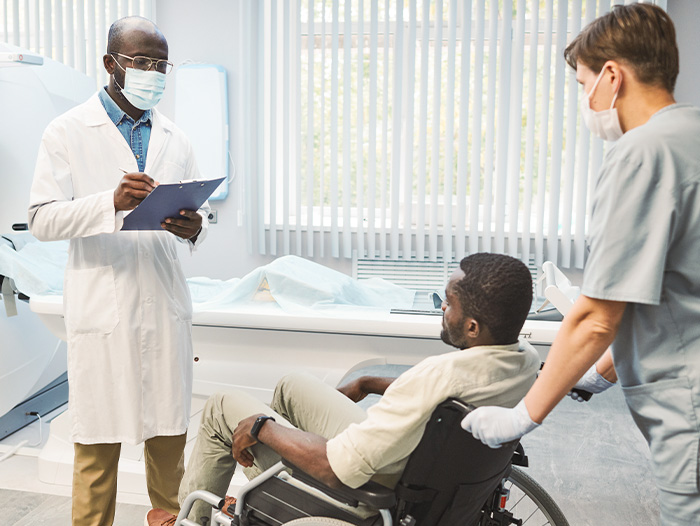Auto logout in seconds.
Continue LogoutOver a third of young adults around the world have disregarded advice from their medical provider in favor of advice from their friends, family, or social media, according to a recent report from the Edelman Trust Institute.
Survey details
For the report, the Edelman Trust Institute conducted an online survey of over 16,000 respondents in 16 countries, including:
- Australia
- Brazil
- Canada
- China
- France
- Germany
- India
- Indonesia
- Japan
- Mexico
- Singapore
- South Africa
- South Korea
- United Arab Emirates
- United Kingdom
- United States
According to the survey, 53% of respondents said, "my healthcare provider is slightly or not qualified to take care of my full range of health issues across physical, mental, social, and environmental dimensions."
As a result, 65% of respondents said that if their provider isn't able to address their medical needs, they go to either friends and family, online searches, or social media, while just 41% said they go to institutional sources like institutional health websites, relevant healthcare company sites, or relevant NGO websites.
In addition, nearly half of respondents ages 18 to 34 said they had disregarded their provider's medical guidance in favor of advice from their friends or family, and over a third had said they had disregarded their provider's medical guidance for advice from social media.
As of Feb. 22, 41 jurisdictions reported either "high" or "very high" levels of influenza-like illnesses (ILI). Outpatient visits for ILI also continue to be elevated above the national baseline (3%) at 5.8%, although there was a slight decrease from the previous week.
Nearly half of respondents ages 18 to 34 said they agreed that the average person who has done their own research is just as knowledgeable on most health matters as doctors, compared to over a third of people ages 35 to 54 and just over a fifth of people ages 55+.
Younger people are increasingly engaging with health information more than older age groups, the survey found. Roughly two-thirds of respondents ages 18 to 34 said they engage with traditional health media at the original source at least monthly.
Similarly, 64% of respondents ages 18-34 said they engage with traditional health media sent to them on social platforms at least monthly, and just over half said they engage with independent health media in podcasts or newsletters at least monthly.
related resources
- Top drivers of change impacting consumer preferences and behaviors
- 3 strategies to boost healthcare consumer engagement
- 6 insights on consumer preferences in healthcare
- Patient experience guide, part 2: The top 5 priorities for providers
- How consumers' healthcare preferences vary by age
- Why are patients losing trust in healthcare?
In addition, younger people are more likely to make health decisions based on nonexpert advice, according to the survey. While 34% of all respondents said that people without formal medical degrees or health credentials "have a big influence over my health decisions," that number was 45% for respondents ages 18-34.
In addition, young people were significantly more likely to have made a health decision they regretted based on misinformation at least once. Nearly 60% of respondents ages 18 to 34 said they had done so, compared to just under half of those ages 35 to 54 and just over a quarter of those ages 55+.
Of those ages 18 to 34 who said they had made a health decision they regretted based on misinformation, the top five sources of misinformation were:
- User-created content platforms (39%)
- Independent content creator (29%)
- Friends or family (25%)
- Traditional media (21%)
- Someone on social media (21%)
"Younger adults have truly created their own health ecosystem with how they're looking for information, who they trust, what they're doing with health information," said Courtney Gray Haupt, global health cochair and U.S. health chair at Edelman.
Don't miss out on the latest Advisory Board insights
Create your free account to access 1 resource, including the latest research and webinars.
Want access without creating an account?
You have 1 free members-only resource remaining this month.
1 free members-only resources remaining
1 free members-only resources remaining
You've reached your limit of free insights
Become a member to access all of Advisory Board's resources, events, and experts
Never miss out on the latest innovative health care content tailored to you.
Benefits include:
You've reached your limit of free insights
Become a member to access all of Advisory Board's resources, events, and experts
Never miss out on the latest innovative health care content tailored to you.
Benefits include:
This content is available through your Curated Research partnership with Advisory Board. Click on ‘view this resource’ to read the full piece
Email ask@advisory.com to learn more
Click on ‘Become a Member’ to learn about the benefits of a Full-Access partnership with Advisory Board
Never miss out on the latest innovative health care content tailored to you.
Benefits Include:
This is for members only. Learn more.
Click on ‘Become a Member’ to learn about the benefits of a Full-Access partnership with Advisory Board
Never miss out on the latest innovative health care content tailored to you.


